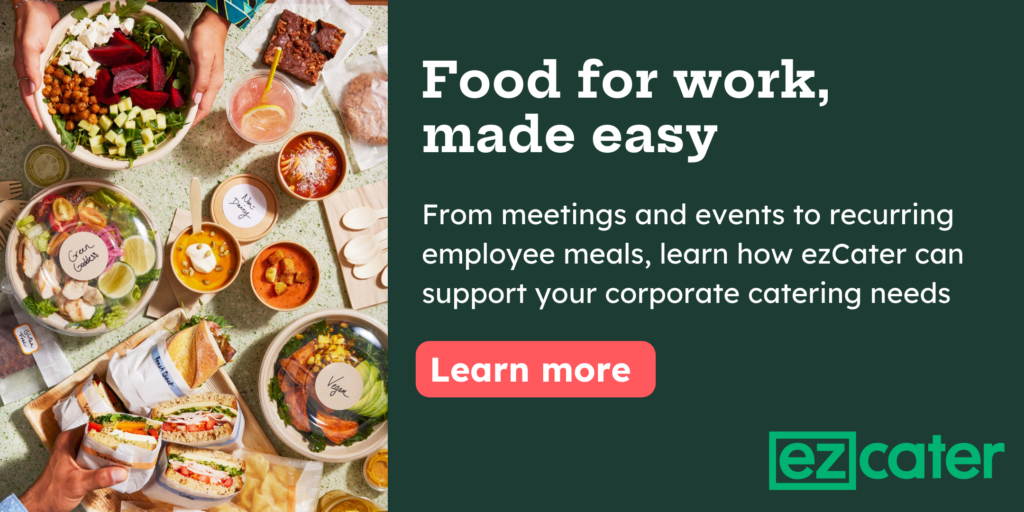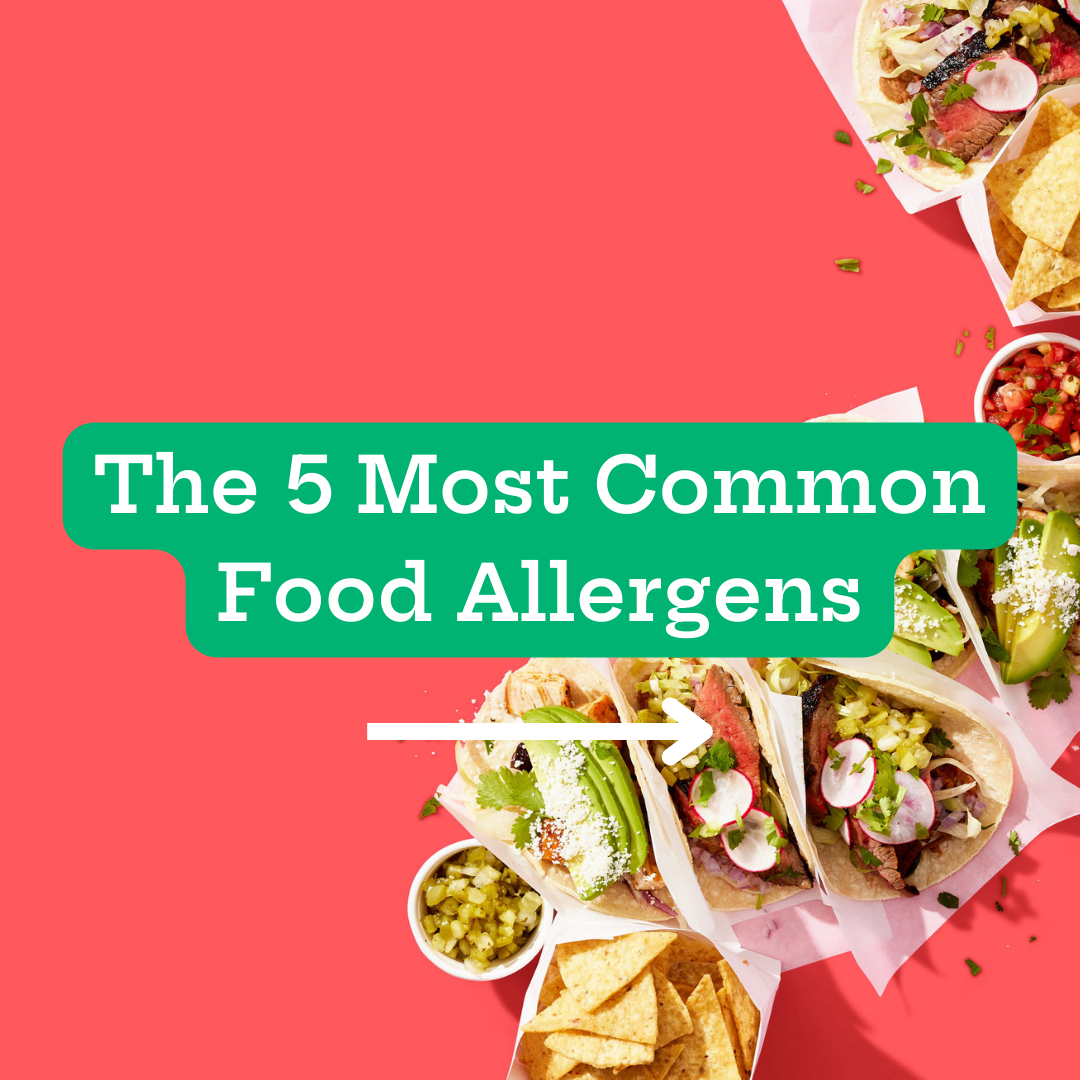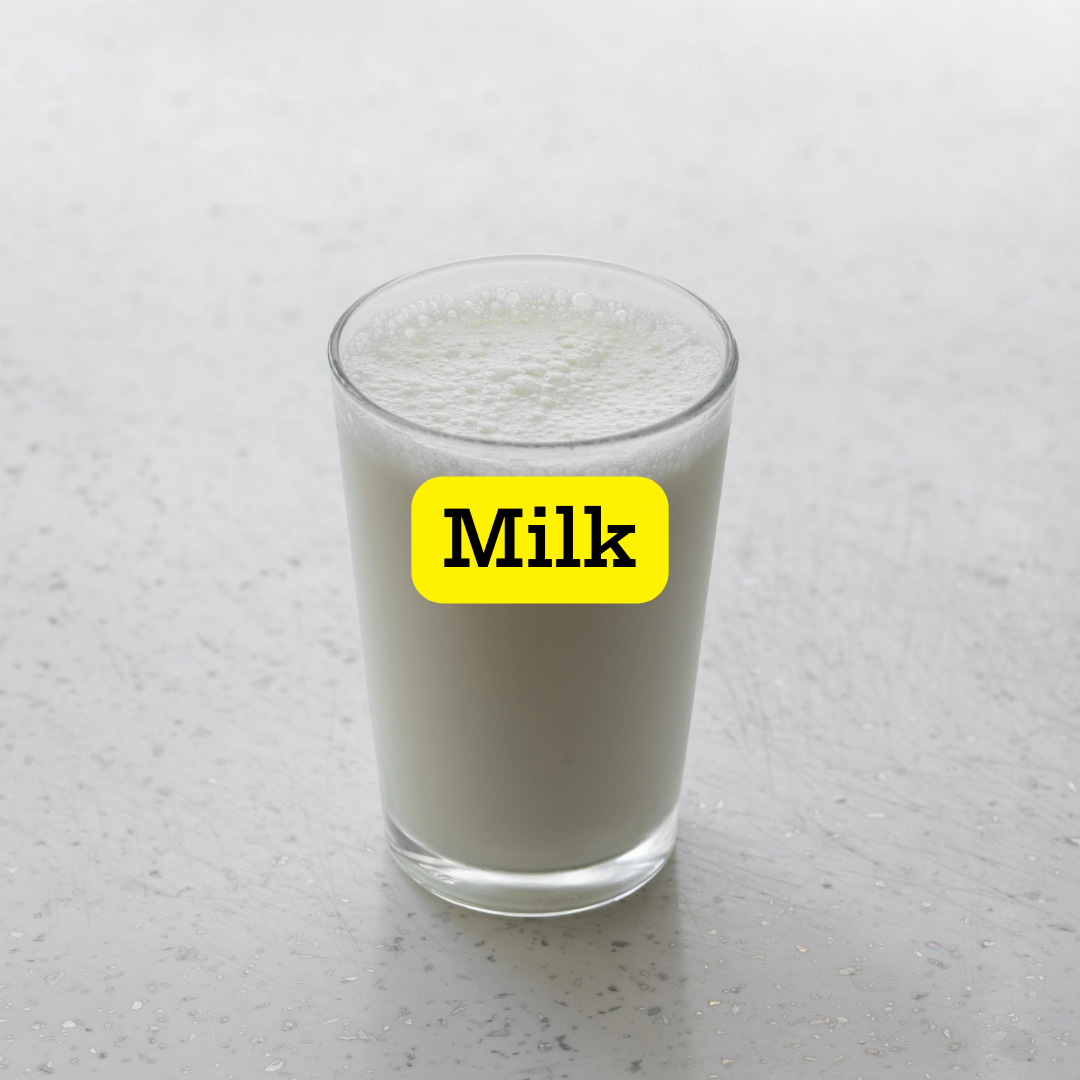Dietary restrictions and preferences: your guide to workplace ordering
- Beth Deyo
- •
- 3 Min Read
- •
Organizing a catered event can feel like a juggling act. You need to choose items everyone will enjoy while staying within your budget and making sure you have enough food. When you add dietary restrictions and preferences into the mix, things can start to feel stressful.
Satisfying guests who are gluten-free or vegan or who have serious food allergies creates a new set of complexities. But here’s the thing: it’s a challenge you can easily tackle with the right tools and a bit of know-how.
At ezCater, we’re no strangers to handling even the most complex of orders, and we’re here to share some insights to help you make sure no one feels left out at the lunch table. The following guide dietary restrictions and preferences is jam-packed with practical tips, smart solutions, and a few creative ideas to ensure every catered event is a hit with the entire crowd.

Food preferences vs. restrictions
Understanding the difference between food preferences and restrictions is a key step to becoming a food ordering guru. Once you have a solid grip on the differences, catering to dietary restrictions in the workplace becomes a bit easier, allowing you to plan a delicious menu that’s also safe, respectful, and inclusive.
To put it simply, food restrictions are the hard lines in the culinary sand. These dietary needs may be related to serious allergies, like a life-threatening reaction to shellfish, or a condition like celiac disease, which requires a gluten-free diet. Ethical and religious choices, like veganism, halal, or kosher diets, also fall under this category. As a general rule, food restrictions are an integral part of the individual’s values and lifestyle, so it’s critical to make the proper accommodations.
On the other hand, food preferences are more about personal likes and dislikes. These are the individuals who say “I’m not into mushrooms” or “I just don’t care for seafood.” While these preferences are important for overall satisfaction, they’re usually more flexible compared to strict dietary restrictions.
Common food sensitivities
Food allergies and sensitivities are a specific, and serious, type of special dietary requirement. Understanding common food allergens allows you to create a safer dining experience and helps you avoid a last-minute shuffle when a guest forgets to mention that they have a food sensitivity.
The most common food allergens include:
- Milk
- Eggs
- Fish
- Shellfish
- Tree nuts
- Peanuts
- Wheat
- Soybeans
- Sesame

01 / 06

02 / 06

03 / 06

04 / 06

05 / 06

06 / 06
When dealing with food sensitivities in the workplace, have an open conversation with your catering provider. Don’t hesitate to ask them whether they have experience handling dietary restrictions like gluten-free, dairy-free, or nut-free menus. You may also ask about their preparation process and how they ensure there’s no cross-contamination. For example, do they use separate cooking utensils and surfaces for allergen-free meals?
Asking the right questions and understanding a caterer’s capability to handle these special requirements can give you peace of mind and help you guarantee a safe dining experience for your guests.
Tips for ordering catering with food preferences in mind
Accommodating workplace food allergies and catering to dietary preferences requires a proactive and thoughtful approach. Whether you’re ordering daily office meals or catering special events, the following tips will help you handle dietary curveballs smoothly.
In the office: catering to every palate
As you’re thinking about ordering food for the office, get a clear picture of your team’s dietary needs and preferences. A simple survey is a great way to gather the necessary information. Not only does this show that you care about everyone’s preferences, but it also helps you navigate dietary restrictions and make informed choices when creating your order.
If members of your team have allergies or dietary restrictions, it may be helpful to work with a caterer willing to clearly label each item. This lets everyone know exactly what they’re choosing and allows them to avoid problematic dishes. Plus, it adds a professional touch to your catering setup.
Individually packed meals are becoming increasingly popular, especially for those ordering for a variety of dietary needs. By ordering individual meals, you can avoid cross-contamination and allow for personalization, making sure each person gets exactly what they need and want.
Planning for events with dietary sensitivities in mind
Planning an event for people with food sensitivities requires a bit more work, but if you pull it off, you’ll really impress your guests. Start by collecting dietary information in advance, ideally through RSVPs. Taking this proactive step allows you to custom-tailor the menu and avoid last-minute stress.
Once you collect the RSVPs, the following steps will help keep you organized and ensure everyone is accounted for:
- Categorize responses: As you review your RSVPs, group the dietary preferences and restrictions into clear categories such as vegetarian, gluten-free, nut allergies, etc. This will make it easier to plan and communicate with your caterer.
- Create a detailed plan: Develop a plan that matches each guest’s dietary needs with specific menu items. Use a spreadsheet or a catering app to track who needs what kind of meal. This will help you make sure all requirements are accounted for and the appropriate number of special meals are prepared.
- Establish a point of contact: Assign a team member or a point of contact at the event who is familiar with the dietary requirements and the menu. This person can assist guests with questions about the food and make sure those with specific dietary needs receive the correct meals.
After the event, it’s also helpful to gather feedback from attendees. Use the information you gather to refine your approach to dietary accommodations in the future.
Foods to consider ordering (and a few to avoid)
As you plan your catering menu, lean toward options that are friendly to dietary restrictions. This can give you added flexibility and ensure the dishes you provide can be enjoyed by most, if not all, of your guests. Dishes like falafel, tacos, and stuffed vegetables are excellent choices, as they can be adapted to suit a range of dietary requirements, including gluten-free, dairy-free, vegetarian, and vegan diets. Not only are these meals safe bets for those with common food sensitivities but they also tend to be crowd-pleasers due to their diverse flavors and adaptability.
Simple, whole foods can also be an excellent option. Fresh fruits, vegetables, and gluten-free grains like quinoa and rice are generally safe and can be used to add variety and a bit of color to your menu. Offering a selection of salads, rice dishes, or fruit platters can help you cater to a wide range of dietary needs while also appealing to health-conscious guests.
Keep in mind that certain foods are commonly linked to allergies and sensitivities. In fact, even just smelling some foods, like cooked fish, can cause reactions in those with severe allergies. Just to be safe, consider avoiding:
- Dishes containing nuts
- Hidden shellfish
- Dairy-heavy dishes
- Gluten-containing foods
- Egg-based dishes
- Soy-based products
Successfully ordering catering in a work environment is all about balance. While you’ll want to cater to specific dietary needs, it’s equally important to make sure the food is enjoyable for everyone. By carefully selecting dishes that offer versatility and keeping a watchful eye on common allergens, you’ll be well on your way to organizing a memorable and inclusive dining experience.
Avoiding cross-contamination
The dangers of cross-contamination can turn an otherwise perfect event into a major health concern, especially for those with serious food allergies or strict dietary requirements. Even a tiny mix-up can have big consequences. Here are a few things you can do to make sure everything your guests consume is both safe and delicious:
- Use separate serving utensils for each dish: Assign separate serving tools for each dish to prevent allergens from hopping from one plate to another.
- Designate allergen-free zones: If you are going to have allergen-containing foods in the workplace, set up special areas for them and label them clearly.
- Communicate openly to your caterer: Have an honest discussion with your caterer about all of your guests’ food allergies and sensitivities to make sure you’re on the same page.
- Label everything clearly: Request that every dish is clearly marked, not just for what it is but for the ingredients it contains, especially potential allergens.
- Adhere to strict food service rules: If you’re catering to individuals with dietary needs like kosher, halal, or other diets based on cultural or religious practices, it’s critical to respect and adhere to their dietary laws. In some cases, this may require separating cooking gear or using special preparation methods.
See what an ezCater customer has to say
ezCater provides food ordering services to a wide range of businesses and professional organizations, simplifying the challenges of catering for teams and guests with a variety of dietary needs. Taylor Anne Adams and Sarayu Sundar from Rice Business recently explained the impact ezCater has had on their organization.
“Before, I was juggling spreadsheets, hunting down menus online, and having to haggle with different vendors,” said Adams. “Now, I can just send a link to my team, and they pick exactly what they want. It’s a game-changer.”
Not only does ezCater simplify food orders, but it also helps create memorable experiences.
“We place such an emphasis on being an inclusive campus and having an inclusive culture, and ezCater has so many different options,” said Sundar. “You’re able to customize whether you’re looking for brisket, or you’re a vegetarian, vegan, or gluten-free, we’ve got all of those options.”
ezCater’s services go beyond just food. Streamlined payment options and features like automatic receipts create the total package for Rice Business and other similar organizations.
“ezCater came in and was just like a magic wand for solving all of our food needs,'” said Sundar. “It really was the magic solution we all were looking for.”
Learn more about ezCater’s corporate solutions.
ezCater has the tools you need
Handling dietary restrictions in catering doesn’t have to be a headache. With ezCater, you’ll have access to the tools you need to handle all types of dietary needs and preferences like a pro. Our platform is designed to simplify the search and planning process, making it easier for you to create an appealing menu and effectively accommodate everyone’s requirements without unnecessary hassle. Here’s a look at just a few of the features that will help streamline your workplace catering experience.
Filtering for specific needs
With ezCater, you won’t have to spend time calling various food providers and evaluating your options. Instead, simply use our platform to easily find restaurants that cater to specific dietary preferences like vegetarian, vegan, or gluten-free. Our filtering tool helps you quickly narrow down the choices to suit everyone’s needs — no spreadsheets required.
Concierge ordering
If you’re pressed for time or want an expert touch, our concierge ordering service can take care of the heavy lifting for you. Just provide the details, like dietary requirements, budget, and event size, and our team will curate a selection of suitable menu options for you to approve.

Individually packed meals
When dietary details really matter, individual boxed lunches can make all the difference. They’re perfect for making sure everyone gets a meal that’s safe and suited just for them. Ordering boxed meals also helps avoid any mix-ups or cross-contamination concerns, and helps with adherence to strict food service rules, like keeping kosher.
Request a demo of ezCater today to see how we can transform your workplace ordering.
Manage dietary restrictions like a pro
Ordering food for people with dietary restrictions can be a challenge, but with ezCater, this task is both manageable and rewarding. With the right tools and strategies, you can make sure that everyone’s needs are met with ease and efficiency.For more insights into the world of workplace food trends, take a look at ezCater’s Food for Work Report. It’s packed with valuable information that can enhance your catering strategies and keep you ahead of the curve.








